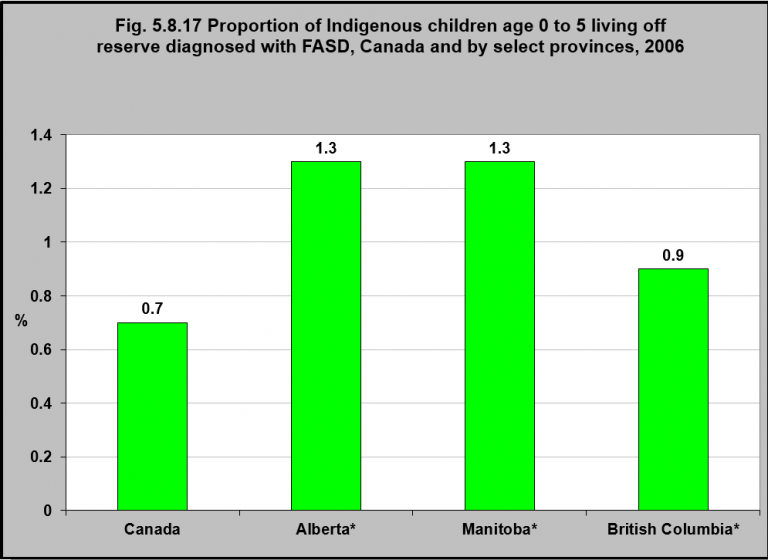Proportion of Indigenous children age 0 to 5 living off reserve diagnosed with FASD, Canada and by select provinces, 2006

Notes:
*Use with caution.
Other provinces and territories had estimates too small to report.
Source: CICH graphic created using data adapted from Werk CM, Xinjie C and Tough S. Fetal alcohol spectrum disorder among Aboriginal children under six years of age and living off reserve. First Peoples Child & Family Review. Voume 8, Number 1, 2013 using data from Statistics Canada 2006 Aboriginal Children’s Survey.
According to data from the 2006 Aboriginal Children’s Survey, the proportion of Aboriginal children under 6, living off reserve, who were diagnosed with Fetal Alcohol Spectrum Disorder (FASD**) was 0.7%.
That proportion varied between provinces – it was 1.3% in Alberta and Manitoba and 0.9% in British Columbia.
Only 50% of those children who were diagnosed received treatment.1
**Fetal Alcohol Spectrum Disorder (FASD) describes a range of disabilities that result from exposure to alcohol during pregnancy.2 Fetal Alcohol Syndrome (FAS) and Fetal Alcohol Effects (FAE) are birth defects caused by the consumption of alcohol during pregnancy.3
1Werk CM, Xinjie C and Tough S. Fetal alcohol spectrum disorder among Aboriginal children under six years of age and living off reserve.First Peoples Child & Family Review. Voume 8, Number 1, 2013 using data from Statistics Canada 2006 Aboriginal Children’s Survey.
2Public Health Agency of Canada. Fetal Alchol Spectrum Disorder. http://www.phac-aspc.gc.ca/hp-ps/dca-dea/prog-ini/fasd-etcaf/index-eng.php-accessed July 29, 2017.
3Health Canada. Fetal alcohol syndrome/Fetal alcohol effects – First Nations, Inuit and Aboriginal Health. Health Canada website https://www.canada.ca/en/health-canada/services/first-nations-inuit-health/family-health/healthy-pregnancy-babies/fetal-alcohol-syndrome-fetal-alcohol-effects-first-nations-inuit-health-main-page.html
Implications
Fetal alcohol spectrum disorders (FASD)4 result from in utero alcohol exposure and are generally characterized by pre- and/or post-natal growth deficiencies, central nervous dysfunction, and cranio-facial malformations.5 The disabilities associated with FASD can have lifelong implications for the health and well-being of individuals. Although the true extent of FASD among Indigenous children is unknown, FASD is considered a significant public health issue in many Indigenous communities and needs be addressed with culturally appropriate methods “that foster cultural reintegration, personal and collective healing, and positive change.”6
4The full spectrum of effects associated with inutero exposure to alcohol are commonly referred to as fetal alcohol spectrum disorders (FASD).
5Tait, C.L. (2003). Fetal alcohol syndrome among Aboriginal people in Canada: Review and analysis of the intergenerational links to residential schools. Ottawa, ON: Aboriginal Healing Foundation.
6Indian Friendship Centres. (2013). Fetal alcohol spectrum disorder: A position paper. Toronto, ON: Author, p. 4.
